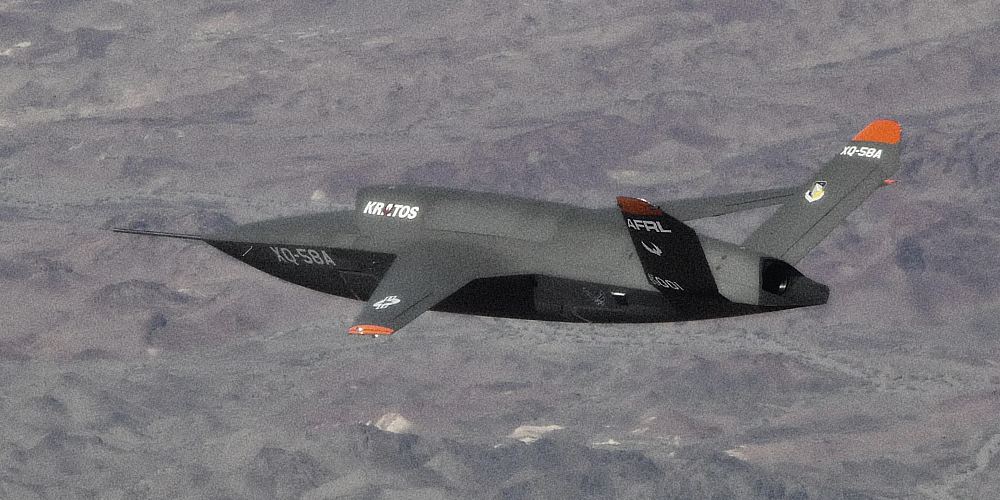- Kratos Defense and Security has confirmed that it successfully completed the first flight of its Thanatos stealth UCAV.
- The company’s next tests will focus on the Thanatos’ integrated systems and their ability to meet mission requirements as stipulated by the Department of Defense.
- While not being confirmed, it is strongly suggested that the Thanatos is being built to serve with the U.S. Air Force.
- Kratos is also developing other combat drones for the U.S. Armed Forces, particularly the XQ-58 Valkyrie stealth UCAV, which could serve with the Air Force and Marine Corps in the next few years.
(Natural News)—Kratos Defense and Security has confirmed the successful first flight of its stealthy unmanned combat aerial vehicle (UCAV), the Thanatos.
The exact date of the flight was not disclosed due to the sensitive nature of the project. The flight was conducted to validate the aircraft’s basic aerodynamic design, marking a significant milestone in the development of the highly classified stealth drone program.
Steve Fendley, president of Kratos’ Unmanned Systems Division, stated that the drone’s flight abilities have been effectively proven. The company is now shifting its focus to testing Thanatos’ integrated systems to ensure it meets mission requirements.
“We’re not trying to figure out ‘Does the airplane fly?’ We’re now trying to figure out ‘Does the integrated system tick the mission box?'” Fendley said. (Related: Mysterious drones swarmed a U.S. military airbase for 17 days; officials say they don’t know who operated them.)
The Thanatos UCAV was first unveiled in November 2023 through a 3D artist’s rendering included in Kratos’ financial report. The design features a single-engine, tailless configuration with a diamond-shaped wing, blended air inlets and a recessed engine exhaust, all of which contribute to its low-observability characteristics. The aircraft’s design also lacks traditional vertical and horizontal stabilizers, reflecting Kratos’ emphasis on stealth technology.
Kratos likely to sell Thanatos to the Air Force
While the identity of the customer for the Thanatos remains undisclosed, the aircraft’s design includes both the markings for Kratos and the United States Air Force, strongly suggesting that the drone’s first operator will be the Air Force.
The company has expressed strong interest in the upcoming Increment 2 of the Air Force’s Collaborative Combat Aircraft (CCA) program, which aims to integrate unmanned assets with Next Generation Air Dominance (NGAD) platforms.
The CCA program, also referred to as the “Loyal Wingman” concept, envisions unmanned aircraft operating alongside crewed fighters to enhance mission effectiveness. Fendley highlighted the potential of CCAs to augment fifth-generation fighter aircraft and offboard systems from fourth-generation aircraft, particularly in electronic warfare to improve survivability.
Kratos has prior experience developing UCAVs under the CCA program, specifically with its experimental XQ-58 Valkyrie stealth UCAV, which is currently in testing with the Air Force and the Marine Corps.
The Valkyrie, which is runway-independent and capable of launching via rockets or a trolley, has demonstrated its operational relevance during exercises like Emerald Flag in October 2024. During this mission, the Valkyrie successfully passed targeting data to Marine Corps F-35Bs, marking a significant step in closing the kill chain.
Fendley noted that the Department of Defense has increasingly prioritized runway independence, a feature that Kratos has incorporated into its UCAV designs. While it is unclear whether the Thanatos will share this capability, the company is exploring conventional takeoff and landing systems with retractable gear.
In terms of manufacturing, Kratos has designed its UCAVs with scalability in mind. A study on the feasibility of a 1,000-unit production run for the Valkyrie revealed that propulsion systems would be the primary constraint. Kratos is collaborating with GE Aerospace to develop scalable engines for future systems, including CCAs.
Watch this Dec. 17 episode of “Brighteon Broadcast News” as Mike Adams, the Health Ranger, discusses the possible use of drones with radar invisibility technology in the United States.
This video is from the Health Ranger Report channel on Brighteon.com.
More related stories:
- Mach 7 drone illustrates China’s latest leap in hypersonic technology.
- Ukraine claims to be developing “unstoppable” AI-controlled drones that can attack targets on the battlefield.
- Iran has developed a new, high-tech combat drone for Russia to use in Ukraine.
- Fully autonomous KILLER DRONES now closer to reality as rapid development of AI continues.
- Advanced swarming drones operated by U.K. defense ministry ready for deployment within months.
Sources include:



